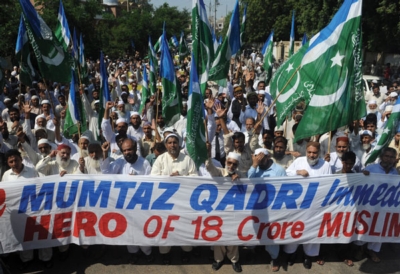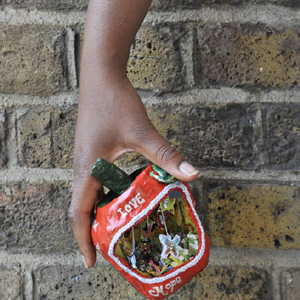
Consider some recent cases. In 2009 a 42-year-old Christian woman, Asia Noreen (also known as Asia Bibi), got into an argument with some Muslim women over a cup of water. Heated words were exchanged. A complaint of blasphemy was lodged against her and she was arrested, tried and sentenced to death. She remains in prison as she appeals her conviction.
In January 2010 the Governor of Punjab, Salmaan Taseer, who had spoken out in support of Asia Bibi and suggested that blasphemy laws needed to be reformed, was himself accused of blasphemy, and then gunned down by his own bodyguard. When the murderer, Mumtaz Qadri, surrendered to police he was greeted as a hero. Some have taken to calling him “Ghazi” (conqueror) for protecting the honour of Islam and killing the alleged blasphemer. Qadri has since been convicted for the murder and sentenced to death. The judge who passed the sentence has had to flee the country after his chambers were fire-bombed by those for whom Qadri is a hero.
In July 2012, in the Chanighot area of Bahawalpur, southern Punjab, a mentally ill man arrested after being accused of throwing pages of the Qur’an into the street was hauled out of police custody by a mob of hundreds, beaten to death and his body set ablaze.
In August Rimsha Masih, a 14-year-old Christian girl with learning difficulties, was accused of committing blasphemy by burning pages of the Qur’an. A formal complaint was made and she was arrested. She spent three weeks in a maximum security prison. She is now free after a judge dismissed the case against her, though she and her family were rushed out of the country for their protection.
And in Karachi on 11 October a mob led by Muslim clerics ransacked and set fire to the house of a teenage boy, Ryan Stanton, after he was accused of sending text messages with blasphemous content. Stanton has now been arrested on blasphemy charges.
On the surface such incidents appear to be motivated by religious passions aroused by acts of desecration: devout believers moved to violence by the wilful trampling of their sacred beliefs. The real motivation is political – commonly a toxic brew of the politics of envy and status and the larger group politics of position, in which religious extremists seek to stir up religious passion for their own ends. The personal desire to settle scores is easily exploited by ambitious clerics looking to make their name as defenders of the faith. Salmaan Taseer was a thorn in the side of the militant groups, with many enemies. The Rimsha Masih accusations seem part of a strategy to chase Christians from the area. Numerous other cases from the files reveal personal motives behind formal complaints of blasphemy: a bangle seller in Karachi accused by a rival shopkeeper; an old woman in Sindh accused by a man who owed her money; a medical supplies salesman given short shrift by a doctor in Hyderabad accused the doctor of blasphemy for flinging away his visiting card, on which was written his name, which happened to be Muhammad.
Pakistan’s blasphemy law originates in the colonial-era legislation designed to minimise inter-faith strife during the Raj. Article 295 of the 1860 penal code legislates against “injuring or defiling places of worship, with intent to insult the religion of any class”. Violations carry a punishment of up to two years’ imprisonment, a fine, or both. Then the law was strengthened because of a case with echoes of the Rushdie affair. In 1923 a book called Rangeela Rasool (The Colourful Prophet) was published by a Hindu author, Prashaad Prataab. Muslims were outraged – the word rangeela means “colourful” but can also mean “playboy” – and protests broke out. The publisher Raj Pal, who refused to give the author’s name, was arrested and charged. In 1929, after a trial lasting five years, he was acquitted, triggering more Muslim outrage. A few months later a young carpenter named Ilm Din, inflamed with the righteous desire to defend the Prophet, lay in wait for Raj Pal at his shop and stabbed him to death. Din was arrested, tried and sentenced to death. Despite a powerful plea in mitigation from his lawyer Mohammad (Ali) Jinnah, the future founder of Pakistan, the appeal was rejected, and an unrepentant Ilm Din was hanged. For many Indian Muslims Ilm Din became a hero, the original “ghazi”.
The Raj Pal affair caused considerable consternation to the colonial authorities, desperate to keep a lid on potentially destabilising sectarian tensions. Even as Raj Pal’s trial unfolded, authorities convened a committee to draft an addition to the penal code, the result of which was Article 295-A, of 1927, which added “deliberate and malicious acts intended to outrage religious feelings of any class by insulting its religion or religious beliefs” to the list of prohibited acts.
And there things stayed until 1977 when Pakistan’s Chief of Army Staff General Zia ul-Haq overthrew the elected government in a coup, set himself up as a dictator and set about “Islamising” the country. This included his moves in 1982, which involved expanding the scope of the laws that covered offences relating to religious beliefs. General Zia’s government, playing the religion card to shore up the regime, expanded the scope of the old hate speech laws with two new articles relating to specific offences towards the Qur’an and the Prophet Muhammad, 295-B and 295-C respectively. Article 295-C critically omitted the word “intent” (removing the prosecution’s burden to prove the perpetrator had intended to blaspheme against the Prophet). They both carried sentences of life imprisonment and, unlike the earlier versions, were cognizable, non-compoundable and non-bailable.
Subsequent years saw further tightening. In 1986 the option of the death penalty was added to that of life imprisonment for violation of 295-C. Then in 1992 a Shariat (Islamic) court recommended that the option of life imprisonment be removed, leaving death as the mandatory punishment. The bill introducing this amendment was passed by the legislature despite objections from many quarters, including many Islamic members of parliament, who considered life imprisonment sufficient punishment for blasphemy. Even the man who drafted the bill, advocate Ismail Qureshi, admitted at the time that some Islamic scholars “argue that blasphemy was a forgiveable offence.” General Zia’s amendments had enshrined in law the most extreme and punitive of many possible Islamic interpretations of blasphemy.
From Raj Pal’s murder in 1929 to the 1980s very few blasphemy complaints were lodged with the authorities. In the 50 years between 1948 and 1979 just 11 were made, and only three more between 1979 and 1986. The numbers have risen sharply since: 44 cases were registered between 1987 and 1999, and there were 52 in the year 2000 alone. According to activists, the total number of complaints (not all of them formally recorded by authorities) has topped 3,000 since the amendments to Article 295. In Pakistan blasphemy is booming.
Records reveal that over these years, most complaints have been filed by Muslims, about half of them against Muslims of other sects and the rest against non-Muslims. Considering that non-Muslims make up at most four per cent of Pakistan’s total population of 190 million, the number of cases against them is clearly disproportionately high. The accused include many individuals who were unaware or simply incapable of knowing what they were doing (including illiterate and mentally ill people). According to a report by IA Rehman, director of the Human Rights Commission of Pakistan, the severity of the punishments under these laws, which generates huge publicity, makes them a handy weapon for furthering the rhetoric of religion as well as for settling scores. Filing complaints against vulnerable people has proved to be “lucrative business” for quite a few clerics, he notes drily. Rehman’s report also raises disquiet about the way in which judges can be intimidated by mobs – many of them members of banned militant outfits – making them reluctant to acquit, especially in high-profile cases.
Some of those accused are formally charged and tried. Others languish in prison for years before being quietly released. Despite the outside pressure, however, as revealed in research by the advocate Amer Nadeem, in cases that do make it before a judge 90 per cent are acquitted. This says less about the rigour of the Pakistani legal system than it does about the flimsiness of the majority of blasphemy accusations.
So far, no superior court has upheld a blasphemy execution, but this does not mean the lives of the accused are safe. More than 50 people have been killed following blasphemy accusations, including pre-trial prisoners murdered in their prison cells and even on court premises. One example is the case from 1993 of Salamat Masih, Manzoor Masih and Rehmat Masih, accused of writing derogatory words about Muhammad on the wall of a mosque. Manzoor Masih was shot dead by Islamic militants during the trial as the police escorted the prisoners out of the court premises. A trial court convicted and sentenced to death the teenage Salamat and his father Rehmat, but this was overturned by another court and they were released. They were forced to flee the country for their own safety. A judge who was on the High Court bench that acquitted Salamat and Rehmat was shot dead after his retirement for his role in the acquittal.
Arguably the first “blasphemy murder” of the modern era was that of Naimat Ahmar, a progressive Christian poet and schoolteacher in Faisalabad. In 1992 handwritten posters in Urdu accusing him of misleading students about the Prophet Muhammad began cropping up all over town. According to the posters (one of which I saw myself when it was faxed to me by the bureau chief of the Frontier Post where I then worked), Ahmar had said that the Prophet used to steal goats (“bakriyan charaya kartey thay”). In Urdu, only a slight accent change differentiates between the words “steal” (churaya) and “graze” (charaya).
Ahmar was stabbed to death by a young man from the militant outfit Anjuman-e-Sipah-e-Sahaba (ASS). Investigations later revealed that the murderer’s uncle had been eyeing Ahmar’s job. The murderer was celebrated. At the jail, policemen openly embraced him.
Subsequent investigations have found that the ASS – which later changed its name to Sipah-e-Sahaba Pakistan (SSP), and, after that was banned, to Ahle Sunnat Wal Jamaat – was behind, or involved with, almost every blasphemy case during the 1990s. This outfit and its offshoots are behind many cases of violence, including the carnage at Gojra village in August 2009 when, following rumours that Christian villagers had desecrated the Qur’an, an armed mob attacked the village killing nine people (subsequent reports revealed the involvement of a “land mafia” who wanted the property vacated).
The recently published memoir of Asia Bibi, Blasphemy, written while she is in jail, throws a queasy light on the motives of the accusers and how easy it is to fall foul of the law. While working picking berries along with other women, Asia drank water from a community well, then dipped the tin cup back to fill it and offer it to another woman. A seamstress named Musarat shouted “Haram!” (forbidden) and told the other women that they should not drink the well water as it was now “unclean”, “dirtied” by a Christian. Asia defended herself and her Christian religion, arguing that it was as good as Islam – the cause for the blasphemy complaint.
Yet in her memoir she is surprisingly forgiving of her accuser and recognises that they share a subordinate place in Pakistan’s strict caste hierarchy: “Musarat wasn’t really an agricultural worker and I didn’t often see her in the fields, so I realised times must be hard for her family. In the end it was just our lot to be poor, all of us.”
In fact Islam has no prohibition on sharing water with someone of a different religion. The objection to Asia’s action was rooted in pre-Islamic caste and class prejudices that still permeate Pakistani society. Most Christians in the Punjab are descendants of low-caste menial workers who converted to Christianity in an attempt to escape the touch taboos imposed by the Hindu social order. Many have found themselves continuing to do the traditional chores assigned to them, like cleaning toilets and picking up waste. But over time, others have been able to move beyond these traditional trades. The very fact that Asia was working in the fields alongside other, Muslim, higher-caste women as an equal reflects the huge social changes taking place in Pakistan. But the resulting tension have led to score settling made easy by the blasphemy laws, with their low threshold of proof, high stakes and headline-grabbing potential.
Typically, blasphemy complaints are lodged several days after the alleged incident, after local clerics and self-styled defenders of the faith have had time to agitate and persuade people to press charges. In this febrile atmosphere, further inflamed by Muslim indignation about America’s drone policy on their borders, and the outrage generated by perceived slander coming from the West, feelings around blasphemy have been raised to a new fever pitch and politicians have been queuing up to prove their Islamic credentials. In the latest twist a government minister publicly solicited assassination – Railway Minister Ghulam Ahmad Bilour has offered a substantial reward to anyone who kills Sam Bacile, the filmmaker behind Innocence of Muslims.
Yet away from the world of public posturing, there are grounds for cautious optimism. Even the most virulent of blasphemy-law defenders are starting to admit that the law is flawed and that amendments are necessary. The Council of Islamic Ideology (CII), Pakistan’s foremost constitutional advisory body regarding Islamic injunctions, has proposed procedural amendments to guard against misuse against any individual, regardless of religion.
Religious scholars like Jawed Ahmed Ghamdi and Khalid Zaheer agree that no notion of blasphemy law exists in Islam and that the Qur’an does not even hint at a worldly punishment for blasphemy. Instead, the holy book urges Muslims to simply ignore what the blasphemers say.
Legal experts have argued for a principled distinction between the different parts of article 295. “Some of the old penal code provisions dating back from colonial times are really anti-hate speech provisions and meant to keep the peace in a multi-religious community vulnerable to waging violence,” comments Lahore-based advocate Osama Siddique. “Sections like 295 A and 298 apply to hate speech against any religion and are decent laws in many ways. These should not be conflated with the references to the infamous blasphemy law which is Section 295 C.”
While some are arguing for repeal, others, like the influential jurist Sibghatullah Qadri, QC, suggest that police procedures need to be tightened up to prevent trivial and malicious accusations from leading to prosecution and to stop people taking the law into their own hands.The weak government of Prime Minister Raja Pervez Ashraf appears to have little choice at the moment but to keep the status quo, given that the alternative is an open confrontation with the right-wing religious groups, something it would like to avoid at all costs.
No matter what happens the case of Rimsha Minah has been a watershed. Following a police investigation, a Muslim cleric, Khalid Jadoon, was arrested for fabricating evidence. He allegedly added burnt pages of the Qur'an in an attempt to strengthen the case against Rimsha. This is the first time the tables have been turned on a Muslim accuser in this way, and has, in the memorable words of Mahmood Adeel in New Pakistan, “exposed the blasphemy law for what it is – a colonial-era law used as a weapon against personal or political enemies.” In another rare case, police have brought a case under Article 295-A (”outraging of religious feelings”), against the Muslims who attacked a Hindu temple in Karachi on September 21, breaking religious statues, tearing up a copy of the Hindu holy book, Bhagavad Gita, and beating up the temple’s caretaker. The perpetrators have yet to be apprehended, but many see the case against them as a start.
Many secularists would like to see the immediate repeal of articles 295-B and 295-C, but this is unlikely for some time to come. Perhaps the most we can hope for is that the law will be enacted more even-handedly, and with more attention paid to evidence, due process and justice, and that the misuse of Pakistan’s blasphemy law over the past 20 years serves as a stark warning to those who would like to see more blasphemy legalisation rather than more freedom.

